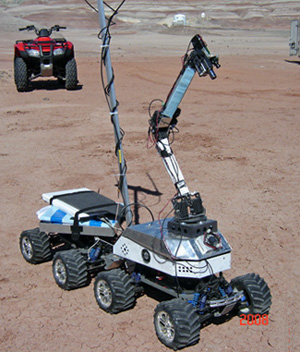 A chance to participate in a prestigious program that provides first-hand access to cutting-edge research doesn’t frequently present itself to undergraduates, but a talented group of students were given such an opportunity when they were selected to participate in a Research Experience for Undergraduates (REU) program this past summer.
A chance to participate in a prestigious program that provides first-hand access to cutting-edge research doesn’t frequently present itself to undergraduates, but a talented group of students were given such an opportunity when they were selected to participate in a Research Experience for Undergraduates (REU) program this past summer.
The National Science Foundation (NSF) started REU’s as a way to “support active research participation by undergraduate students” in science, technology, engineering, and mathematics. This past summer’s participants in REU’s associated with the College of Engineering came from Ames, Mexico, and various places between for a chance to participate in research at Iowa State.
The personalities, goals, and research focuses of each REU program is unique, but they all provide students contact with accomplished faculty, research education, a social atmosphere, and a job in a state-of-the-art lab. Each summer, participants are paired with faculty and research labs based on their interests. Although many of them are conducting real-world research for the first time, they are given the respect and responsibility of experienced researchers.
“Although all research has a ‘grunt work’ component, these students are not here to simply perform menial lab duties,” says Raj Raman, professor of agricultural and biosystems engineering and program director of the Sustainable Biomass Production and Processing Systems REU and of the Center for Biorenewable Chemicals REU. “They are intelligent, hard-working individuals who put in full weeks because they are here to experience and conduct real, original research.”
Overall, the REU program is designed to foster student interest in research and continued higher education.
“A main goal for us each year is to get students excited about their summer research topic and about all research,” says Pranav Shrotriya, professor in mechanical engineering and program co-director for Microscale Sensing Actuation and Imaging.
Participants in the programs have access to graduate students, faculty, and program coordinators who are willing to answer any questions they may have about their future in research and what further education may hold for them.
“We consider it a success if students go to graduate school or any kind of continuing education,” says Monica Lamm, professor in chemical and biological engineering and program co-director for the Biological Materials and Processes REU.
Summer research projects concluded with a symposium August 5, giving students the opportunity to share their research and explore the findings of other participants.
“Even if their research project wasn’t completed by the end of summer, each student had a goal to reach,” says Pam Shill, program coordinator for the Summer Program for Interdisciplinary Research and Education – Emerging Interface Technologies. “We have even had students go on to revise and publish the final papers they wrote.”
Read about what students were up to in the REU programs this past summer:
- Biological Materials and Processes
- Microscale Sensing Actuation and Imaging
- National Science Foundation REU at the Center for Biorenewable Chemicals
- Summer Program for Interdisciplinary Research and Education – Emerging Interface Technologies
- Sustainable Production and Processing Systems for Biomass Derived Fuels of the Future
- Wind Energy Science, Engineering, and Policy
